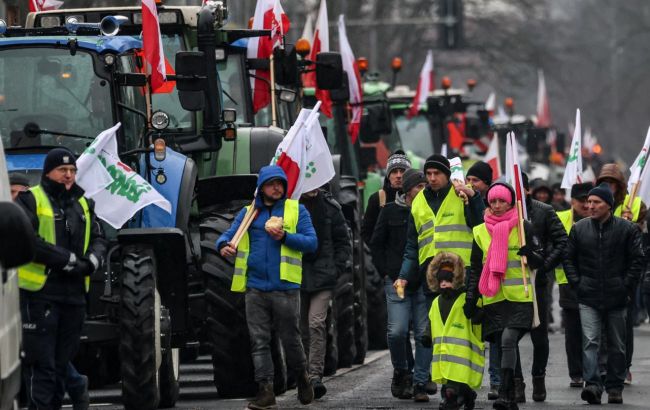Ukraine-Poland border blocked again: Why Polish farmers protest and how Ukraine can respond
 Polish farmers' strike (photo: Getty Images)
Polish farmers' strike (photo: Getty Images)
Polish farmers blocked several checkpoints on the border with Ukraine. In parallel, farmers' actions are taking place in other European countries. Read the article by RBC-Ukraine to find out what farmers are unhappy about, how much their discontent is related to Ukraine, and why Kyiv has not yet managed to resolve trade issues.
The situation with the supply of Ukrainian agricultural products to Poland and transit through this country to Europe has escalated to a breaking point in recent days. Earlier Polish transporters and farmers simply blocked the passage of Ukrainian trucks with goods across the border, but they took more radical actions last week. On February 11, protesters damaged several trucks near the Dorohusk checkpoint on Polish territory. As a result, the grain being transported in transit to Lithuania spilled out onto the road.
The cynical prank of Polish farmers against Ukrainian grain, which is harvested in wartime in mined areas, provoked an immediate reaction from the Ukrainian authorities. Foreign Minister Dmytro Kuleba called it a provocation and demanded that the perpetrators be punished. "For the sake of friendly Ukrainian-Polish relations, the perpetrators of this provocation must be held to account," he said. The Embassy of Ukraine called the incident a "shameful crime" and appealed to the Polish police to open a case over the incident.
 Ukrainian grain scattered on the border with Poland (photo: Getty Images)
Ukrainian grain scattered on the border with Poland (photo: Getty Images)
Even the Ukrainian ambassador to the United States, Oksana Markarova, reacted. She called for not succumbing to provocations and constructively resolving any disputes.
The next day, the prosecutor's office in Chełm (Lublin Voivodeship) opened an investigation into the destruction of property and violation of customs security, which can result in up to 5 years in prison.
Polish Minister of Agriculture Czeslaw Siekierski apologized for what he said was an inadequate form of protest, explaining it by the desperation of Polish farmers who are in a difficult economic situation.
"On the eve of spring fieldwork, they have no money to buy fertilizers and plant protection products. It's hard not to understand their desperation," Siekierski said. The investigation in Poland has been going on for several days and there are no results yet.
When and why protests started
After Russia's full-scale invasion of Ukraine, the EU fully opened its markets to Ukrainian goods, lifting supply quotas and other restrictions. These conditions are valid until June, and now they are planned to be extended for another year. After the grain corridor was shut down, the flow of goods across Ukraine's land border with neighboring countries increased. In Poland, and later in Slovakia, Romania, Hungary, and Bulgaria, there was dissatisfaction with the influx of goods, and in May the European Commission imposed temporary restrictions on the import of a number of products into these countries. This mostly affected wheat, corn, rapeseed, and sunflower seeds. These restrictions were lifted in mid-September, as the EC considered fears of a threat from Ukraine to the markets of the disgruntled five countries to be unfounded.
However, Poland categorically disagreed with the EC's position, which later escalated into protests. At first, the border for goods from Ukraine was blocked by transportation companies. Imports to Poland and transit through it to other EU countries were virtually blocked. These actions were linked to the elections in Poland, and it was hoped that they would stop after the election of a new government.
Indeed, after the new Prime Minister Donald Tusk formed the government, the transport workers' actions were curtailed. This immediately affected Ukraine's economy. Whereas at the end of last year, due to the reduction in international transportation, monthly losses amounted to up to $400 million, in January of this year, when there was no blockade, according to the Ukrainian Customs Service, the increase in revenues amounted to UAH 11 billion. The GDP in January increased by almost 3.5% compared to last year, partly due to the end of the blockade.
"The lifting of the blockade of the Polish-Ukrainian border by Polish road carriers in the middle of the month had a positive impact on both exporters and manufacturers who are heavily dependent on imported raw materials," said Yulia Svyrydenko, Minister of Economy of Ukraine.
But the lull did not last long. On February 9, it was not the transport workers who started protesting, but Polish farmers. They blocked three checkpoints - Medyka-Shehyni, Hrebenne-Rava-Ruska, and Dorohusk-Yahodyn - allowing only one bus, truck, and car to pass through per hour. Since then, the blockade has continued, and it is completely chaotic Some checkpoints open for a while, but then close again There have been cases where the same checkpoint has changed its mode of entry three times a day The traffic does not stop completely, but the intensity is such that more than a thousand cars accumulate on both sides of the border.
Denys Marchuk, deputy head of the All-Ukrainian Agrarian Council, does not rule out that the farmers' actions may also be related to the local elections, which will be held in Poland in April. "The problem is getting worse - local elections are coming in April... If there was political will, it would be possible to stop all this," he said.
Farmers protest not only in Poland
However, the farmers' protests are not limited to Poland. Since the beginning of the year, they have already occurred in Germany, Belgium, Spain, the Netherlands, and France. The reasons for the discontent are almost the same: rising production costs, increased imports, and strict environmental policies.
In addition, many farmers, including those in Poland, are dissatisfied with the decline in grain prices, which rose abnormally in 2022, in part due to the blockade of the grain corridor from Ukraine, and have now fallen.
"Of course, if a ton of corn used to cost $380, and now it's $210, it's a disaster. Of course, none of the farmers like the fact that prices have become much lower. In addition, in many countries, farmers are dissatisfied with the EU's agricultural policy. Their products are subject to stricter environmental requirements than imported ones," said the agricultural market source. He did not rule out that in this general context, Ukraine, which has trade preferences, may be perceived as a source of problems.
Of course, only the governments of both countries can resolve transportation and trade problems. The Ukrainian government is being extremely cautious not to aggravate the situation. Although there have been no particular results so far, the Ministry of Economy still hopes to reach an agreement with the Polish side, and no retaliatory actions are planned soon.
"We are not at a dead end yet. Our goal is to agree on lifting the restrictions. We need to look for a way out not in the plane of bans," said Taras Kachka, Ukraine's trade representative. He also said that during the negotiations, all EU countries have already been informed of the possibility of Ukraine's retaliatory measures. "We officially have a notice of anti-discrimination measures, and we have informed all EU countries that we are ready for such things," the Ukrainian trade representative told EP.
The Polish government is more decisive in its actions. Soon, Polish services will check all grain entering Poland from Ukraine for compliance with quality standards, Polish Deputy Minister of Agriculture Michal Kolodziejczak said recently. According to him, the reason for the need for such checks is that in some cases, grain that was in transit from Ukraine to Germany was allegedly of poor quality (technical) and returned to Poland.
According to Polish Prime Minister Donald Tusk, competition rules are being violated in the supply of grain. "We want to help Ukraine as a state and Ukrainians as a people in the armed confrontation with Russia. Undoubtedly, our position here does not change. But it cannot be that because of the war and because of our empathy and openness to Ukraine, someone will take advantage of this to compete unfairly and unequally with our companies, our farmers," he said on February 12.
Meanwhile, Polish farmers have announced that they will block all border crossings with Ukraine starting February 20. This also includes entrances to railway stations and seaports. So far, the action is planned for a month. However, it is unlikely that the problem will be resolved within this period. Although the Ukrainian trade representative is optimistic, he admits that it will take a long time to resolve the problem. "The conversation (with the Polish side - ed.) is that there is a problem and it needs to be solved. This does not mean that we will solve it in two hours. It will take the whole of 2024," Kachka said.
While diplomatic negotiations are underway, Ukrainian farmers and the economy as a whole will suffer losses. It is difficult to estimate the size of these losses, as it is impossible to predict the scale of the protests. However, the blockade will harm both budget revenues and GDP growth.

